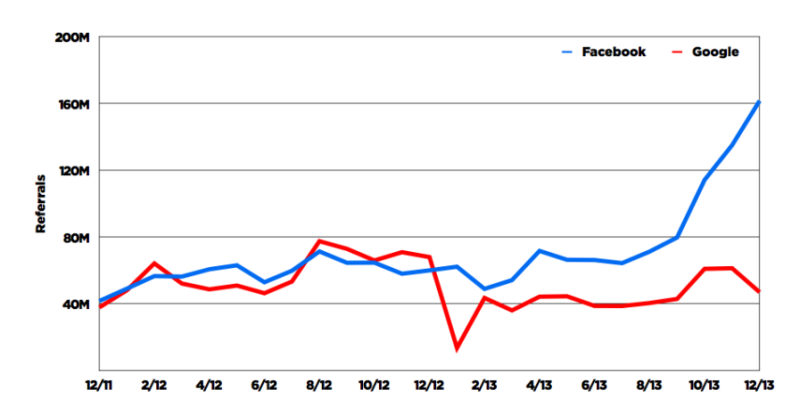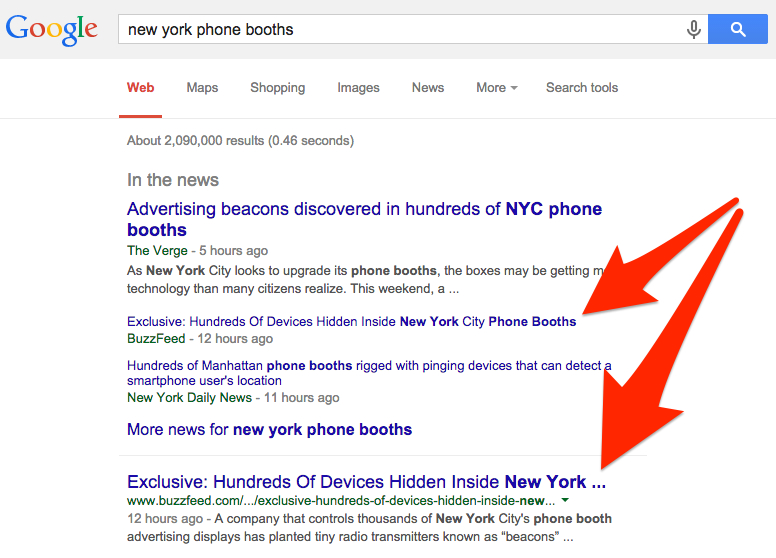How A Google Mistake That Killed BuzzFeed’s Traffic Turned It Into A Social Media Powerhouse
What helped turn BuzzFeed into a site that is the poster child for riding social media into massive popularity and traffic? Ironically, search goliath Google. Early on in BuzzFeed’s history, getting mistakenly hit by a Google penalty caused BuzzFeed to focus on social — a decision that’s been phenomenally successful for the media company. BuzzFeed founder […]
What helped turn BuzzFeed into a site that is the poster child for riding social media into massive popularity and traffic? Ironically, search goliath Google. Early on in BuzzFeed’s history, getting mistakenly hit by a Google penalty caused BuzzFeed to focus on social — a decision that’s been phenomenally successful for the media company.
BuzzFeed founder and CEO Jonah Peretti relayed the story when I talked with him last week on stage at our SMX conference in New York.
The Google Penalty That Paid Off
Soon after Peretti had turned his attention to BuzzFeed full-time in 2011, after leaving the Huffington Post, BuzzFeed took a hit from Google. The site had been trying to focus on building traffic from both social media marketing and through SEO. But the SEO traffic — the free traffic driven from Google’s search results — dried up.
As it turned out, it was an error on Google’s end. It took Peretti about a month to track down the right people at Google (he name-checked Google’s head of search quality at the time, Matt Cutts). Google saw that BuzzFeed was embedding widgets from a related domain it owned, apparently for traffic management purposes. Google assumed it was malware being injected into BuzzFeed, Peretti said, and gave BuzzFeed a penalty.
Focusing On Social
By the time the error was resolved, BuzzFeed had shifted direction. Rather than try to balance content aimed to do well with both social and search, BuzzFeed was forced to focus entirely on social to get through the search slump — and it kept that focus going forward.
It especially helped because Peretti’s view is that it’s hard to make content that works for both search and social. That video of cute kittens, for example, isn’t something people are necessarily searching for, so checking that it has the right keywords associated with it doesn’t help.
[pullquote]BuzzFeed gets 75% of its 150 million unique visitors per month through social media[/pullquote]
Today, Peretti says that BuzzFeed gets 75% of its 150 million unique visitors per month through social media. And as for Google and SEO, it’s something he said that BuzzFeed doesn’t really think about.
The Social Is Bigger Than SEO Debate
The great success BuzzFeed has had with social also has caused some to declare that SEO is in decline, especially for news sites, after BuzzFeed shared stats for sites in its network earlier this year.
The stats, shared in this Recode article from February 2014, put Facebook as sending about four times the traffic as Google search to BuzzFeed and sites within its BuzzFeed network, as of December 2013:
The Atlantic ran with those stats, declaring “On the web, we rarely see search engine optimized (SEO) stories anymore.”
In response, Marshall Simmonds of Define Media shared his own stats from 87 sites across major publishing networks, finding that search drove 2 1/2 times the traffic that social did:
What was Peretti’s take on the seemingly conflicting stats? Is SEO really on the decline? He said it was really down to the particular sites, though for news, Peretti does believe more and more people are getting their news content through social.
Will Google Finally Harness Social For Rankings?
Perhaps most interesting was Peretti’s hope that Google will eventually understand how to make use of social signals to rank content. Currently, Google has only acknowledged making use of Google+ connections to improve the rankings of some content for logged-in users.
Peretti said that when millions of people are signaling that they like BuzzFeed’s (or anyone’s) content through Facebook likes, Twitter shares or via other social media, that’s data he thinks Google should be harnessing.
I certainly agree, and my When Everyone Gets The Vote: Social Shares As The New Link Building article explains more about this.
I do suspect, however, that BuzzFeed is missing out on SEO traffic that it could be getting alongside social. As the site develops more original news content, especially around trending topics, there continue to be people who will search for it through search engines. Why not tap into that, too?
Of course, BuzzFeed does appear to be making some attempts here. For example, the BuzzFeed story out this weekend about phone booths in New York that are tracking passers-by makes use of the News Keywords meta tag specifically designed to help publishers attract traffic from Google News. And, at the moment, anyone searching for “New York phones booths” who has heard about the story easily finds BuzzFeed in Google:
Still, there’s no doubt that social has emerged as a new and welcomed major traffic source for news publishers as well as other sites alongside search. As BuzzFeed learned, social means an insurance policy against a search catastrophe — just as search can provide a balance for those who might get hit by some social change.
For more on Peretti’s talk, see our live blog as well as the live blog done at Bruce Clay.
Opinions expressed in this article are those of the guest author and not necessarily MarTech. Staff authors are listed here.
Related stories



